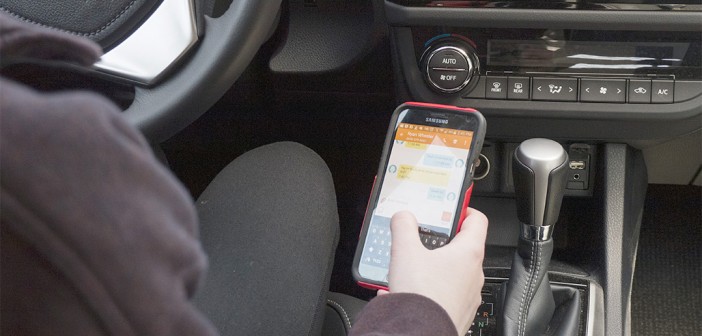While driving to class, a student’s phone on the seat next to the driver dings with a text message. Out of habit, the driver reaches to answer the text. For a minute, or even just a few seconds, the driver’s eyes are on the phone instead of the road. This behavior — called distracted driving — is a dangerous, nationwide problem.
According to a report from the Administrative Office of Pennsylvania Courts, citations given out because of distracted driving in Pennsylvania have increased by 43 percent in the past year. These citations are mainly because of texting while driving. Over 400,000 people were injured in a motor vehicle crash because of distracted driving in 2013, which is a 10 percent increase from 2012, according to the Centers for Disease Control and Prevention.
In the United States, over eight people are killed and over 1,000 are injured in crashes that involve a distracted driver each day, according to the Centers for Disease Control and Prevention.
“It is illegal in Pennsylvania to use your cell phone while driving to send or receive texts, emails or messages of any kind,” according to the safety laws in Pennsylvania on the Department of Motor Vehicles website. “If you are caught using your mobile device for any of the above purposes, the PA Department of Transportation will issue you a $50 fine.”
A study done by the Center for Disease Control showed that 31 percent of drivers in the U.S. ages 18-64 reported texting while driving in the month before the survey was issued.
Edward Shupp, the Lehigh chief of police, believes the biggest problem on campus is not texting and driving, but traffic control violations. He said not all students obey the traffic signs such as stop signs and one-way road signs.
“We actually do not have any violations this year for texting and driving,” Shupp said.
The Lehigh University Police Department works to combat distracted driving by cracking down on students who disobey driving laws, not just texting and driving. Shupp said all drivers can be safer by paying attention to their surroundings and obeying traffic rules at all times. Because students walk all over campus, Shupp said it is important to pay attention to pedestrian crosswalks.
Shupp said the speed board is placed around campus, and officers will stop someone for driving too fast or driving erratically. He also said there are no speed traps on campus.
“There are way too many people who disregard the rules and drive way too fast,” Matt Levin, ’18, said. “I think there are certain spots that they could station Lehigh police, like up on the hill, because people fly through there. If there were certain spots where cops could sit out one car at certain times of the day, I think that would actually be most effective.”
Rachel Sholder, ’16, the president of Peer Health Advisers, said she believes Lehigh students are generally safe drivers. She said speeding around curves, especially on the Hill, is one of the biggest problems, along with too many people on campus having cars.
Distracted driving not only involves using a phone, but can also occur when a driver’s mind is not focused on driving. Although texting and driving is illegal in Pennsylvania, making phone calls while driving is legal. It is, however, recommended to pull off the road or use a hands-free calling system to reduce the risk of getting in an accident. The Department of Motor Vehicles also advises drivers to avoid emotional conversations to decrease the rate of distracted driving.
Sholder said alcohol consumption, stress and sleep patterns can all lead to distracted driving. She said driving tired can be just as bad as driving drunk. If Lehigh students are not getting enough sleep or are too stressed, this could lead to distracted driving.






Comment policy
Comments posted to The Brown and White website are reviewed by a moderator before being approved. Incendiary speech or harassing language, including comments targeted at individuals, may be deemed unacceptable and not published. Spam and other soliciting will also be declined.
The Brown and White also reserves the right to not publish entirely anonymous comments.